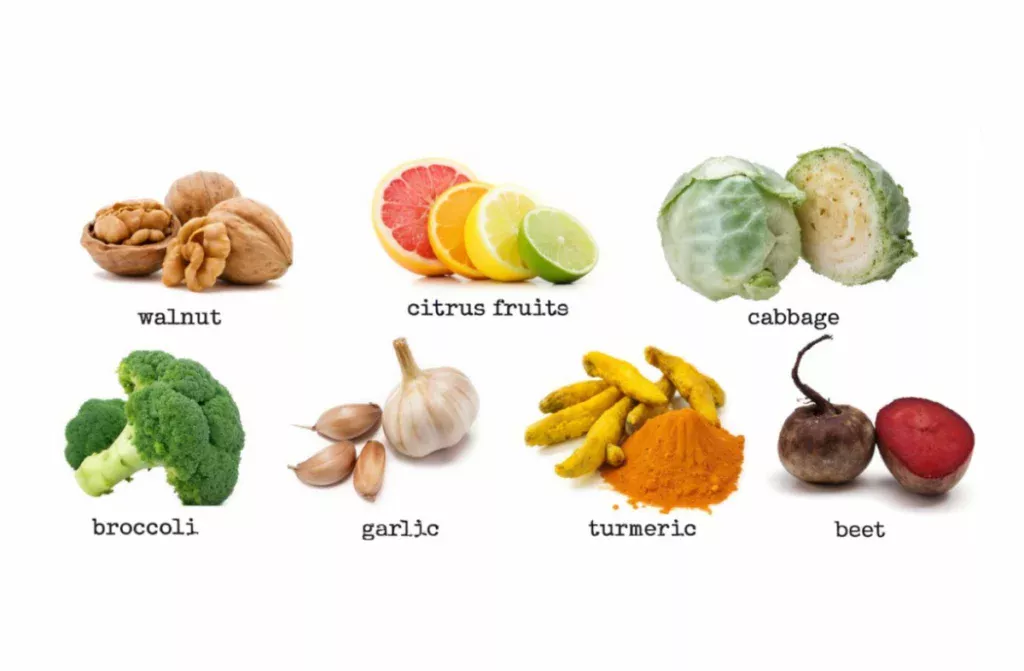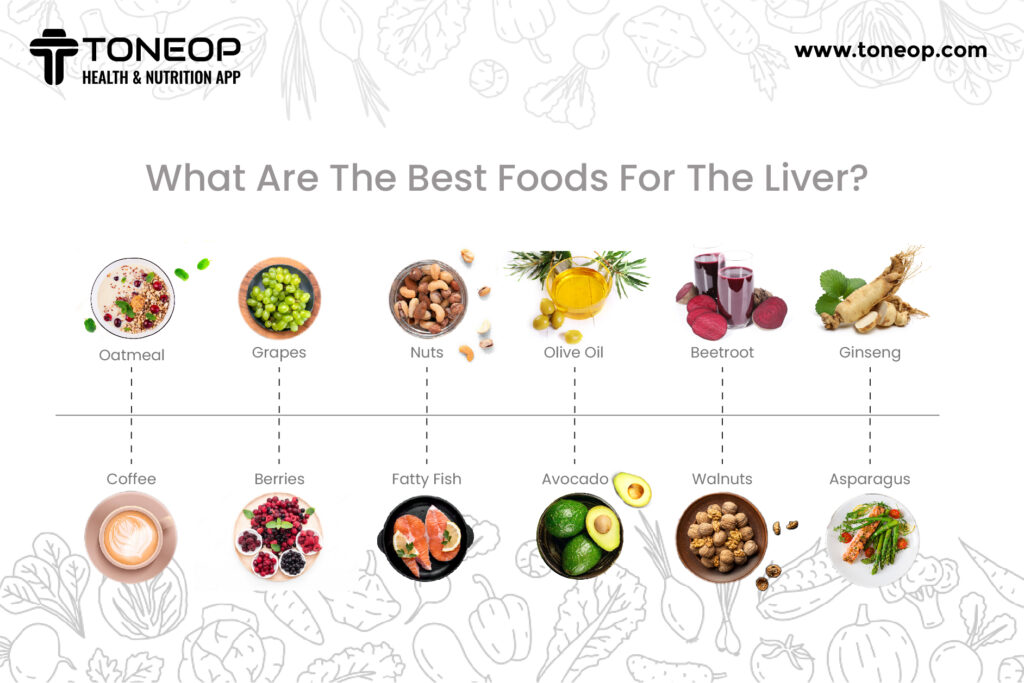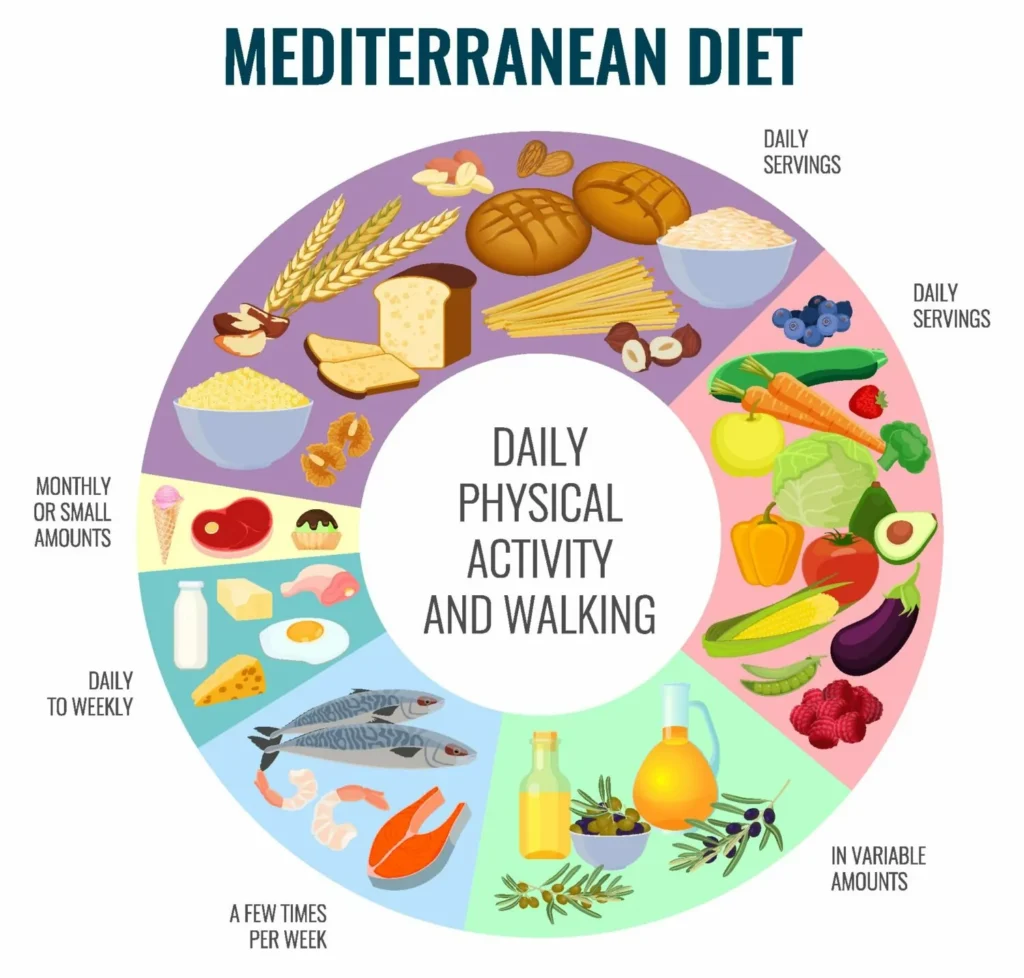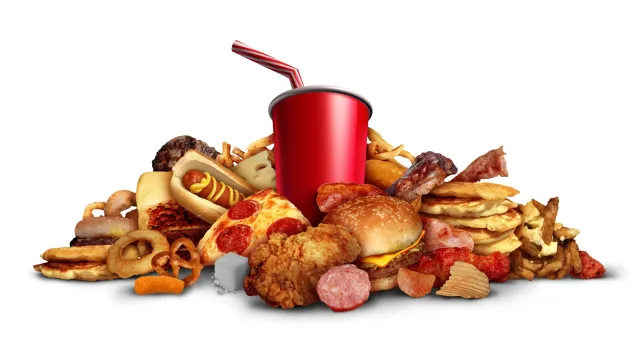
The liver is a powerhouse organ that filters toxins, processes nutrients, and supports metabolism keeping your body energized and balanced. What you eat directly affects how well it functions. A diet rich in vegetables, olive oil, fish, and whole grains helps protect the liver from fat buildup, inflammation, and long-term damage.
This guide explores how nutrient-dense foods and smart eating habits can keep your liver healthy and resilient. You’ll learn which foods to prioritize, what to avoid, and how small, consistent changes like following a Mediterranean-style diet can restore balance, boost energy, and support your body’s natural detox system.
Key Takeaways:
- Mediterranean-style eating is most effective for liver protection.
- Coffee, green tea, and fatty fish lower liver fat and inflammation.
- Avoid sugary drinks, alcohol, and refined carbs to prevent liver strain.
- Fiber, omega-3s, and choline are essential for liver repair and fat metabolism.
- Hydration, portion control, and steady weight management improve enzyme health.
- Consistency, not supplements or “detox” fads, keeps the liver healthy long-term.
Understanding Liver and Why It Matters
The liver acts as your body’s main processing plant. Every bite you eat, every sip you take, and many of the chemicals you encounter go through it.
It performs three key jobs:
- Metabolism: It converts food into energy, stores glycogen, and helps digest fats.
- Detoxification: It filters out alcohol, medications, and metabolic waste.
- Production: It makes bile for digestion and proteins that regulate blood clotting and immunity.
A healthy liver keeps you energized, protects your heart, and maintains hormonal balance. But poor diet, excess calories, or alcohol can lead to fat buildup, known as metabolic dysfunction-associated steatotic liver disease (MASLD) formerly called fatty liver. Over time, that can cause inflammation, fibrosis, and scarring.
How Food Influences Liver Health
Food can either burden or benefit your liver. A diet high in refined carbs, sugary drinks, and processed fats can overwhelm it, while nutrient-dense, fiber-rich foods help it recover and perform optimally. The goal isn’t to “detox” the liver it’s already your body’s detox system. Instead, you want to nourish it so it can perform that function naturally and effectively.
When the liver gets the right nutrients:
- Fat accumulation slows down.
- Inflammation decreases.
- Blood sugar and insulin stay stable.
- Cells regenerate more efficiently.
Top Foods That Support Liver Health

Your liver thrives on a variety of natural, nutrient-rich foods that help it filter toxins, reduce fat buildup, and fight inflammation. Below are the most evidence-based options and practical ways to include them in your daily meals.
1. Coffee
Regular coffee consumption is one of the simplest ways to support liver health.
- Benefits: Lowers the risk of fatty liver, fibrosis, and cirrhosis. Its antioxidants, such as chlorogenic acids, reduce oxidative stress and support healthy liver enzyme function.
- How to include: Brew it fresh and limit added sugar or cream. If sensitive to caffeine, opt for half-caf or one to two cups per day.
2. Green Tea
Green tea is rich in catechins, powerful plant compounds that protect liver cells.
- Benefits: Reduces fat buildup, improves inflammation, and enhances antioxidant activity in the liver.
- How to include: Brew lightly and enjoy one to three cups daily. Avoid high-dose green tea extracts, which can sometimes stress the liver.
3. Fatty Fish (Salmon, Mackerel, Sardines)
Fatty fish provide omega-3 fatty acids that are essential for controlling inflammation and fat metabolism.
- Benefits: Helps lower triglycerides and liver fat, particularly in individuals with metabolic disorders.
- How to include: Eat two to three servings per week. Bake, grill, or steam instead of frying.
4. Extra-Virgin Olive Oil
Olive oil is a cornerstone of liver-friendly diets such as the Mediterranean diet.
- Benefits: Improves cholesterol levels, reduces liver fat, and lowers inflammation.
- How to include: Use for cooking, salad dressings, or drizzling over cooked vegetables.
5. Nuts and Seeds (Walnuts, Flaxseeds, Chia)
Nuts and seeds provide plant-based omega-3s, fiber, and antioxidants that protect the liver.
- Benefits: Walnuts have been shown to lower the risk of fatty liver and support better metabolic health.
- How to include: Add a handful to oatmeal, yogurt, or salads for extra texture and nutrients.
6. Legumes (Beans, Lentils, Chickpeas)
Legumes are rich in plant protein and fiber that stabilize blood sugar and promote liver recovery.
- Benefits: Improve insulin sensitivity and reduce liver fat accumulation.
- How to include: Add beans or lentils to soups, stews, or salads at least three times a week.
7. Whole Grains (Oats, Barley, Brown Rice, Quinoa)
Whole grains provide slow-releasing energy and essential nutrients that support metabolic balance.
- Benefits: Help regulate blood sugar and insulin, reducing fat buildup in the liver while promoting gut health.
- How to include: Replace white rice, bread, or pasta with whole-grain alternatives.
8. Cruciferous Vegetables (Broccoli, Cauliflower, Brussels Sprouts)
These vegetables contain compounds that enhance the liver’s natural detoxification processes.
- Benefits: Sulforaphane and other antioxidants activate liver enzymes and protect liver cells.
- How to include: Steam, roast, or stir-fry lightly to preserve nutrients and flavor.
9. Berries and Colorful Fruits
Berries, cherries, and pomegranates are rich in antioxidants that protect liver tissue.
- Benefits: Anthocyanins and other plant compounds reduce inflammation and oxidative stress.
- How to include: Add to oatmeal, smoothies, or enjoy as a healthy snack.
10. Fermented Foods (Yogurt, Kefir, Kimchi, Sauerkraut)
Gut health and liver health are closely connected through the gut-liver axis.
- Benefits: Probiotics in fermented foods help maintain healthy gut bacteria, reducing inflammation that affects the liver.
- How to include: Have plain yogurt or kefir for breakfast, or small servings of kimchi or sauerkraut as side dishes.
11. Herbs and Spices (Turmeric, Cinnamon, Garlic)
Herbs and spices are concentrated sources of antioxidants and anti-inflammatory compounds.
- Benefits: Turmeric’s curcumin and garlic’s sulfur compounds enhance liver detox pathways and reduce inflammation.
- How to include: Use them regularly in cooking instead of excess salt, sugar, or processed sauces.
12. Hydration: Water Comes First
Adequate hydration supports overall metabolism and helps the liver process and remove toxins efficiently.
- Benefits: Promotes circulation, digestion, and waste elimination, indirectly supporting liver function.
- How to include: Aim for six to eight glasses of water daily, adjusting for climate and activity level.
The Best Eating Pattern for a Healthy Liver
A balanced and consistent eating pattern plays a major role in protecting and restoring liver function. The right diet not only supports detoxification but also reduces fat buildup and inflammation that can harm the liver over time. Choosing whole, nutrient-rich foods can make a lasting difference in how efficiently your liver performs.
The Mediterranean-Style Diet

Among all studied eating styles, the Mediterranean diet stands out as the most beneficial for liver health. It focuses on vegetables, fruits, whole grains, legumes, nuts, olive oil, and fish.
Research shows that people who follow this pattern have better liver enzyme levels, reduced fat in the liver, and a lower risk of fibrosis. The combination of healthy fats, fiber, and antioxidants supports insulin balance and lowers inflammation two critical factors in preventing liver damage.
This isn’t a restrictive diet. It’s a sustainable lifestyle emphasizing real, minimally processed foods. Small daily improvements like swapping butter for olive oil or replacing soda with sparkling water can produce real changes over time.
Weight and Energy Balance: The Foundation of Liver Recovery
Even the most nutrient-rich foods can’t offset chronic overeating. When you consistently consume more calories than you burn, fat accumulates not only under your skin but also in your liver.
Studies show that losing 5 to 10% of your body weight can significantly improve liver enzyme levels and reduce liver fat. It doesn’t have to happen quickly slow, steady progress through balanced meals and physical activity works best.
Focus on mindful eating, portion awareness, and small, lasting changes. That’s the foundation on which all other liver-healthy habits rest.
Foods and Drinks to Limit for liver

Even a good diet can’t offset daily exposure to harmful foods. Avoid or minimize:
- Sugar-sweetened beverages: These are a major contributor to fatty liver. Replace them with water, unsweetened tea, or sparkling water.
- Diet sodas and processed drinks: Research is still evolving, but regular use may affect metabolism.
- Alcohol: If you have liver issues, it’s safest to avoid alcohol entirely. Even small amounts can worsen inflammation.
- Refined carbohydrates: White bread, pastries, and sweets quickly raise blood sugar and promote fat storage.
- High-dose supplements: Large doses of “liver detox” or green tea extract supplements can sometimes cause harm rather than help.
Key Nutrients to Focus On
The liver depends on specific nutrients to regenerate cells, process fats, and neutralize toxins effectively. Including these key components in your diet strengthens your body’s natural defense and repair systems, ensuring your liver performs at its best. Balanced nutrition not only supports detoxification but also helps prevent fat accumulation and inflammation over time.
- Fiber (25–35 grams/day): Helps eliminate waste, balances blood sugar, and feeds healthy gut bacteria.
- Omega-3 fats: Support fat metabolism and reduce inflammation.
- Polyphenols: Found in coffee, tea, olive oil, and berries they protect liver cells from oxidative damage.
- Choline: Aids fat export from the liver. Found in eggs, soybeans, and fish.
Smart Cooking and Eating Strategies
Healthy eating isn’t just about what you eat it’s also about how you prepare and enjoy your food. Making simple, mindful changes in your cooking methods can protect your liver while enhancing flavor and nutrition. These small shifts help reduce excess fats, sugars, and calories that can strain liver function.
- Fill half your plate with vegetables at lunch and dinner.
- Choose lean proteins (fish, legumes, eggs).
- Use olive oil instead of butter or margarine.
- Cook by roasting, steaming, grilling, or baking instead of deep frying.
- Add herbs and spices for flavor instead of salt or sugar.
- Eat slowly, and stop when comfortably full.
Sample One-Day Liver-Friendly Menu
Putting liver-friendly principles into action is easier when you have a clear example to follow. This sample menu shows how balanced, whole-food meals can support liver repair, energy, and overall health throughout the day. Each meal focuses on natural ingredients that nourish your body without overloading it with processed fats or sugars.
Breakfast: Oatmeal with berries, flaxseeds, and a spoonful of plain yogurt.
Lunch: Grilled salmon with quinoa, steamed broccoli, and olive oil dressing.
Snack: A handful of walnuts or a small apple.
Dinner: Lentil and vegetable stew with sautéed greens on the side.
Smart Grocery List
Building a healthy liver starts at the grocery store. Keeping nutrient-rich staples in your kitchen makes it easier to prepare balanced, wholesome meals every day. By planning ahead and choosing fresh, whole ingredients, you can naturally support liver health without relying on processed or packaged foods.
When you stock your kitchen with the right staples, healthy eating becomes automatic.
- Olive oil
- Nuts and seeds (especially walnuts, flax, chia)
- Whole grains (oats, quinoa, barley, brown rice)
- Legumes (beans, lentils, chickpeas)
- Fatty fish or canned salmon
- Fresh or frozen vegetables (broccoli, cauliflower, spinach)
- Berries or low-sugar fruits
- Yogurt, kefir, or other fermented foods
- Herbs and spices (turmeric, garlic, cinnamon)
Tracking Progress and Staying Consistent
Improving liver health is a gradual process that depends on patience and consistency. Small, steady changes in your diet and lifestyle create lasting improvements in liver function, energy, and overall well-being. Monitoring your progress helps you stay motivated and make adjustments when needed to maintain healthy habits long-term.
Dietary changes take time to show results. You can monitor progress by:
- Tracking how often you eat whole foods vs. processed ones.
- Reducing sugary drinks or alcohol.
- Watching weight trends and energy levels.
- Rechecking liver enzyme levels (ALT, AST) with your doctor every few months.
Conclusion
Your liver is central to your body’s energy, detoxification, and metabolism. A diet built around whole, unprocessed foods like vegetables, fruits, olive oil, legumes, and fatty fish protects it from fat buildup and inflammation. Replacing sugary drinks and processed foods with nutrient-rich options helps the liver repair itself and maintain balance. Regular hydration, moderate coffee or tea, and fiber-rich meals enhance its ability to function smoothly. Avoiding alcohol and extreme diets ensures long-term liver resilience. With small, consistent choices rooted in the Mediterranean-style pattern, you can strengthen your liver, stabilize energy levels, and reduce future disease risk naturally.
FAQs
How much coffee is actually good for the liver?
Research shows that drinking 2 to 4 cups of coffee per day can significantly lower liver fat and enzyme levels, thanks to its antioxidants. However, you should adjust your intake based on caffeine tolerance and avoid adding excess sugar or cream.
Are green tea extracts safe?
Brewed green tea is generally safe and highly beneficial for liver health due to its catechin content. However, high-dose green tea extracts can sometimes cause liver strain, so it’s best to stick with freshly brewed tea unless a doctor advises otherwise.
What if I don’t eat fish?
If you avoid fish, you can still maintain a liver-friendly diet by getting omega-3 fats from walnuts, chia seeds, and flaxseeds. You may also consider algae-based DHA supplements, which provide similar anti-inflammatory benefits for the liver.
Are diet sodas better than sugary ones?
Diet sodas may cut down sugar intake but can still interfere with metabolism and insulin balance. Water, sparkling water, or unsweetened herbal teas remain the healthiest beverage choices for long-term liver support.
Which fruits are best for liver health?
Berries, apples, and citrus fruits are top choices because they’re rich in antioxidants and lower in natural sugar. If you have insulin resistance, limit high-sugar tropical fruits like mangoes or pineapples to prevent liver fat buildup.
Is olive oil better than coconut oil?
Yes. Olive oil provides heart- and liver-protective monounsaturated fats that help reduce inflammation and liver fat. In contrast, coconut oil is higher in saturated fat, which may not be ideal for those managing liver concerns.
How quickly can I expect improvements?
Most people notice improvements in liver enzymes and energy levels within 8 to 12 weeks of consistent healthy eating. However, results depend on individual habits, weight management, and overall lifestyle balance.
Can I eat eggs if I have liver concerns?
Yes, eggs can be part of a balanced liver-friendly diet when eaten in moderation. They are rich in choline, a nutrient that helps prevent fat accumulation in the liver and supports healthy metabolism.
Do “detox” juices work?
Not really. The liver is already your body’s natural detox organ, and juice cleanses often provide little benefit. Whole fruits and vegetables are far more effective and safer for supporting long-term liver health.
Is any alcohol safe for fatty liver?
For most people with fatty liver, the safest choice is to avoid alcohol altogether. Even small amounts can worsen inflammation, slow liver recovery, and increase the risk of long-term liver damage.
Dr. Amiah Rainey researches diet–disease relationships with expertise in vitamins, minerals, and biomarker methods. She earned a PhD from Harvard T.H. Chan School of Public Health (2019) and completed a postdoctoral fellowship at the NIH/NIDDK. With ~20 peer-reviewed publications (example) and experience on NIH-funded cohort studies, Amiah translates complex evidence into practical guidance. She advises on study design, evidence grading, and data transparency. Profiles: ORCID, Google Scholar; list affiliations and any disclosures.

